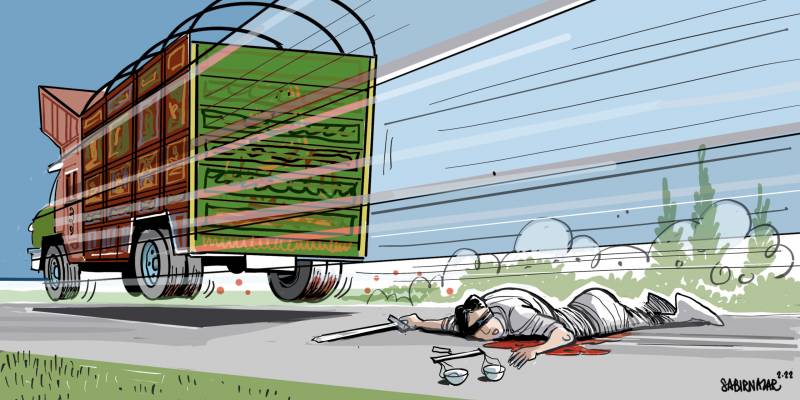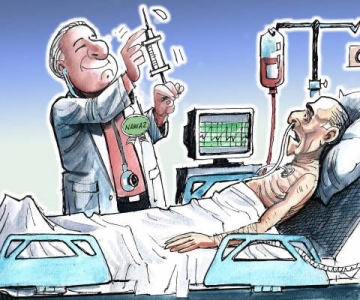The ‘civil war’ within the Supreme Court of Pakistan has intensified. On April 4, a three-member bench headed by Chief Justice of Pakistan (CJP) directed the Election Commission of Pakistan to hold the Punjab elections on May 14. The legitimacy of this verdict, however, has been questioned by dissenting judges themselves. In a 25-page-long note, Justice Minallah holds that the suo motu action that led to the April 1 decision had been dismissed by the majority of judges on the bench.
A day before this note was issued, the parliament passed a resolution rejecting the SC decree as a minority verdict. This was an extraordinary development. Perhaps for the first time in the country’s history, a judicial verdict had been rejected by the parliament. The legislature’s view has been bolstered by Justice Minallah’s note.
This crucial “verdict” by Justice Minallah reconfirms an earlier judgement authored by his colleague Justice Mansoor Ali Shah. The messages are clear: the courts must not be seen as partisan, the judiciary should stay out of political contests, and the SCP’s administration under CJP Bandial is dysfunctional. These are scathing observations by the judges of the top court.
Justice Minallah wrote that the assumption of suo motu jurisdiction in the elections case was rejected by 4 judges out of the 7 on the bench; and “this was the understanding in the meeting held in the anteroom on 27.02.2023.” Contrary to the impression given, Justice Minallah neither recused himself “nor had any reason to dissociate” from the bench. This is a clear indictment of the CJP and the two other judges who issues the April 1 verdict.
The court must not allow any stakeholder to use its forum for advancing its political strategy or gaining advantage over other competitors. It is the duty of the court to ensure that political stakeholders are not encouraged to bring their disputes to the courts for judicial settlement by bypassing the institutions and forums created under the Constitution. – J Minallah
The judge, in his note, questioned the “process of constitution of benches and allocation of cases” that ought to be “transparent, fair and impartial”. The key issue today is that political battles are being fought before judges who are neither elected nor qualified to handle political affairs.
Justice Minallah notes that the “court must always show extreme restraint in matters which involve the political stakeholders […] The court must not allow any stakeholder to use its forum for advancing its political strategy or gaining advantage over other competitors. It is the duty of the court to ensure that political stakeholders are not encouraged to bring their disputes to the courts for judicial settlement by bypassing the institutions and forums created under the Constitution”.
Pakistan’s civil society and independent analysts have long held that judicial interventions end up undermining public trust in the independence and impartiality of the top court. As Justice Minallah notes, judicialisation of politics “encourages the political stakeholders to shun the democratic values of tolerance, dialogue and settlement through political means.”
It is heartening that Justice Minallah has echoed a key concerns of rights activists that the Supreme Court should focus on the thousands (fifty thousand to be precise) of cases pending before the judges. Such cases, according to Justice Minallah, “ought to be given priority over the political stakeholders who are under an obligation to resolve their disputes in the political forums through democratic means”.
This note will have far reaching consequences, as it shows the way forward for the judges across the country and for those who will succeed the current crop of adjudicators: “This court has a duty to preserve public trust and confidence and not to appear politically partisan. This is what the Constitution contemplates,” Justice Minallah writes.
The Chief Justice had been reminded time and again that the manner in which he was fixing benches and handling proceedings were going to compromise the legitimacy of the apex court. Justice Minallah confirms that by stepping into “already murky waters of the domain of politics” is “likely to erode public confidence” in the judiciary.
“This court cannot and must not appear or be seen as advancing the political strategies of political stakeholders. The public trust will be eroded in the independence and impartiality of the court if it appears or is seen to encourage undemocratic norms and values.” J. Minallah
The glaring omission in recent judicial proceedings has been the inability of the judges to question the “conduct” of political stakeholders that does not entitle them to invoke the jurisdiction of Supreme Court under Article 184(3) of the Constitution “lest it is seen or appears to facilitate or promote undemocratic values and strategies”.
Imran Khan’s trump card — of dissolving the provincial assemblies of Punjab and KP — was questionable to begin with. Justice Minallah minces no words: “Is such conduct in consonance with the scheme of constitutional democracy? Is it not in itself a violation of the Constitution? Should this court allow its forum to be exploited for advancing political strategies or appear to be encouraging undemocratic conduct? Should this court not take notice of forum shopping by political stakeholders by invoking the jurisdictions of high courts and this court simultaneously?”
The judge adds: “This court cannot and must not appear or be seen as advancing the political strategies of political stakeholders. The public trust will be eroded in the independence and impartiality of the court if it appears or is seen to encourage undemocratic norms and values.”
“The power struggle between the political stakeholders is undermining the welfare and economic conditions of the people of this country. The people of Pakistan have been made to suffer for a long time by depriving them of their fundamental rights. The long spells of undemocratic regimes validated by this court have caused irretrievable loss to the country and its people.”
The mutiny, for the lack of better word, in the apex court is going to have ramifications for the institution itself, and for the political future of Pakistan. In the immediate term, the survival of the Chief Justice appears unclear.
Justice Minallah’s candid remark that the judiciary has not learnt “any lessons from our bleak history” is the clearest indicator that we are on the brink of repeating it. “We cannot erase the judgments from the law reports but at least endeavour to restore public trust and confidence so that the past is forgotten to some extent. When politicians do not approach the appropriate forums and bring their disputes to the courts, the former may win or lose the case, but inevitably the court is the loser,” Justice Minallah writes.
The mutiny, for the lack of better word, in the apex court is going to have ramifications for the institution itself, and for the political future of Pakistan. In the immediate term, the survival of the Chief Justice appears unclear. A private complaint in the Supreme Judicial Council was filed against him on Friday. With the derisive no-confidence in his administration from a growing number of judges, his position has become even more tenuous. Even if he completes his term, his moral authority stands eroded.
For the institution, there is a chance of redemption. Justice Qazi Faez Isa takes over the reins of SCP in September; aided by level-headed judges, the apex court can turn the course of history by building the SCP as an enabler of democratic institutions, instead of one that appropriates the powers of other branches of government or plays to the popular or powerful galleries.
When politicians do not approach the appropriate forums and bring their disputes to the courts, the former may win or lose the case, but inevitably the court is the loser – J Minallah
For the PTI, the news might not be too appealing. Elections in Punjab seem even more unlikely now. If the proceedings of the National Security Committee on Friday are any indicator, then the miltablishment appears to be backing the coalition, or is setting the agenda. But this should not make the PDM complacent. It has already lost considerable ground in the electoral arena. If it continues to shy away from a political initiative, and rely solely on a bailout from the miltablishment, then the current impasse and intra-institutional conflicts might lead to a systemic breakdown. It has happened before.
The author is Editor, The Friday Times and founder of Naya Daur Media. Earlier, he was editor, Daily Times and a broadcaster with Express News and Capital TV. His writings are archived at www.razarumi.com



